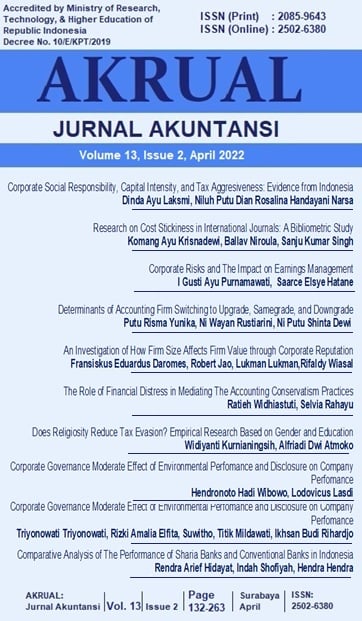Research on Cost Stickiness in International Journals: A Bibliometric Study
DOI:
https://doi.org/10.26740/jaj.v13n2.p144-158Keywords:
asymmetrical cost behavior, bibliometric, cost stickiness, ScopusAbstract
Contemporary points of view have posited that cost behavior is asymmetrical and tends to be sticky. The purpose of this study is to determine the development of cost behavior research, especially about cost stickiness, in reputable international journals. There are 142 articles that meet the criteria which have been obtained from the Scopus database. Bibliometric analysis has been performed with the help of the VOSviewer application. The results of the analysis show that research related to cost stickiness has increased in the last decade. The cost stickiness research consists of the following clusters: 1) the health industry; 2) labor costs; 3) social, environmental and sustainability issues; 4) corporate governance; 5) specific problems in manufacturing; and 6) leadership characteristics. The topics of research on cost stickiness that are still being researched are related to the role of the environmental community, business strategy, and the role of managerial leadership. In this analysis, the authors also show that articles that treat cost stickiness as an independent variable are limited. Based on the results of this analysis, we provide suggestions regarding opportunities for research on cost stickiness in the future.
References
Ballas, A., Naoum, V. C., & Vlismas, O. (2020). The Effect of Strategy on the Asymmetric Cost Behavior of SG&A Expenses. European Accounting Review. https://doi.org/10.1080/09638180.2020.1813601
Bhimani, A., Horngren, C. T., Datar, S. M., & Rajan, M. V. (2019). Management and Cost Accounting (7th ed.). Pearson Education Limited.
Bradbury, M. E., & Scott, T. (2018). Do managers understand asymmetric cost behavior? Australian Journal of Management, 43(4), 538-554. https://doi.org/10.1177/0312896218773136
Costa, M. D., & Habib, A. (2020). Trade credit and cost stickiness. Accounting & Finance, acfi.12606. https://doi.org/10.1111/acfi.12606
Drury, C. (2018). Management and Cost Accounting (10th ed.). Cengage Learning.
Hanif, M. (2018). Cost and Management Accounting - I. McGraw Hill Education (India).
Hartlieb, S., Loy, T. R., & Eierle, B. (2020). Does community social capital affect asymmetric cost behaviour? Management Accounting Research, 46(August 2017), 100640. https://doi.org/10.1016/j.mar.2019.02.002
Jiang, W., Wentao Yao, & Hu, Y. (2016). The enforcement of the minimum wage policy in China and firm cost stickiness. China Journal of Accounting Studies, 4(3), 339-355,. https://doi.org/10.1080/21697213.2016.1218631
Kim, J.-B., Lee, J. J., & Park, J. C. (2019). Internal Control Weakness and the Asymmetrical Behavior of Selling, General, and Administrative Costs. Journal of Accounting, Auditing & Finance, 0148558X1986811. https://doi.org/10.1177/0148558X19868114
Ko, H., Chung, Y., & Woo, C. (2020). Choice of R&D strategy and asymmetric cost behaviour. Technology Analysis and Strategic Management. https://doi.org/10.1080/09537325.2020.1862786
Krisnadewi, K.A., & Soewarno, N. (2021). Optimism and profit-based incentives in cost stickiness: an experimental study. Journal of Management Control, Article in. https://doi.org/10.1007/s00187-020-00309-w
Lai, S., Li, X., & Chan, K. C. (2021). CEO overconfidence and labor investment efficiency. North American Journal of Economics and Finance, 55. https://doi.org/10.1016/j.najef.2020.101319
Lee, J., Park, J.-H. H., & Hyeon, J. (2019). Co-CEOs and asymmetric cost behavior. Sustainability, 11(4), 1046. https://doi.org/10.3390/su11041046
Li, Z., Ying, Q., Chen, Y., & Zhang, X. (2020). Managerial risk appetite and asymmetry cost behavior: evidence from China. Accounting and Finance. https://doi.org/10.1111/acfi.12692
Riegler, C., & Weiskirchner-Merten, K. (2020). Research note: an analytical perspective on market decisions and asymmetric cost behavior. Review of Managerial Science, n/a(n/a), n/a. https://doi.org/10.1007/s11846-020-00379-z
Zhang, J., Yin, M., Han, J., & Aroskar, R. (2019). Why is asset-light strategy necessary? An empirical analysis through the lens of cost stickiness. Tourism Management Perspectives, 32(July), 100571. https://doi.org/10.1016/j.tmp.2019.100571
Zhong, T., Sun, F., Zhou, H., & Lee, J. Y. (2020). Business Strategy, State-Owned Equity and Cost Stickiness: Evidence from Chinese Firms. Sustainability, 12(5), 1850. https://doi.org/10.3390/su12051850
Downloads
Published
How to Cite
Issue
Section
License
Copyright (c) 2021 AKRUAL: Jurnal Akuntansi

This work is licensed under a Creative Commons Attribution-NonCommercial 4.0 International License.
 Abstract views: 1361
,
Abstract views: 1361
, PDF Downloads: 1259
PDF Downloads: 1259


















